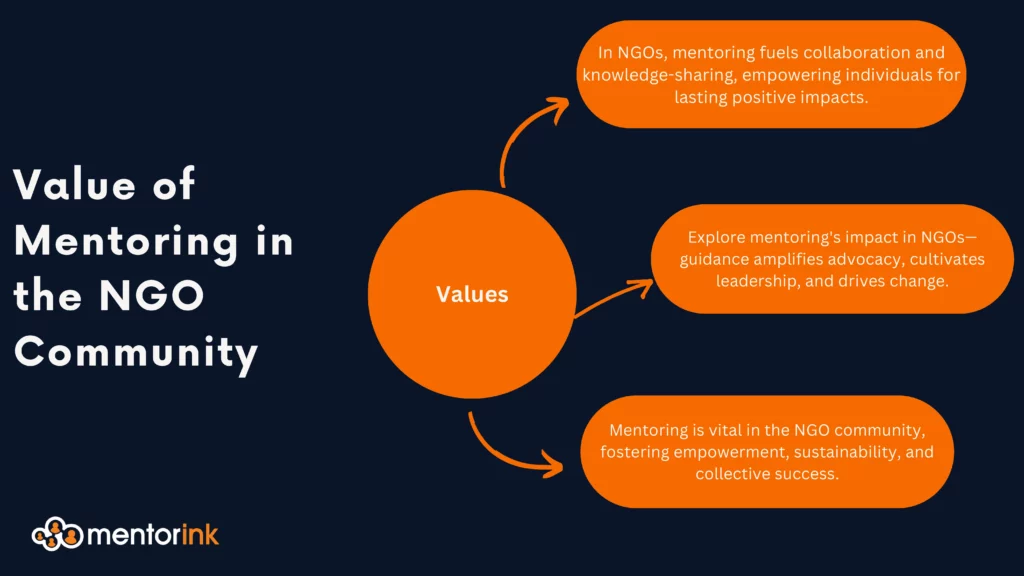
Introduction
Importance of mentoring in the NGO community🗒️
The purpose of my post is to highlight the value of mentoring in the NGO (non-governmental organization) community. Mentoring is an essential part of professional development in any field, and it is especially important in the nonprofit sector, where staff and volunteers may have limited resources and face unique challenges. Effective mentoring relationships can help individuals in the NGO community to develop their skills, increase their confidence. Also it can help navigate the complexities of the sector. By discussing the importance of mentoring in the NGO community, I hope to encourage more organizations and individuals to prioritize mentorship as a means of enhancing their impact and achieving their goals.
Benefits of Mentoring in the NGO Community
The various benefits that mentoring can offer to individuals and organizations in the NGO community, such as: ✌
Mentoring can offer a range of benefits to both individuals and organizations in the NGO community. Some of these benefits include:
- Personal and professional growth
- Increased job satisfaction
- Knowledge transfer
- Networking opportunities
- Improved retention
- Enhanced organizational effectiveness
Types of Mentoring Programs in the NGO Community
Different types of mentoring programs that exist in the NGO community, such as:❓
There are several types of mentoring programs that exist in the NGO (non-governmental organization) community. Some of these types include:
- One-on-one mentoring: This is the most traditional form of mentoring, in which a more experienced individual provides guidance and support to a less experienced individual on a one-on-one basis. This type of mentoring can be formal or informal, and can be initiated by either the mentor or the mentee.
- Group mentoring: This involves a group of mentees working with one or more mentors. This type of mentoring can be effective for sharing knowledge and experiences among a larger group of individuals.
- Peer mentoring: This involves a mentoring relationship between two individuals who are at a similar stage in their careers. Peer mentoring can be effective for building relationships among colleagues and developing skills together.
- Reverse mentoring: This is a type of mentoring in which a less experienced individual provides guidance and support to a more experienced individual. This type of mentoring can be effective for building relationships and sharing knowledge across generations or departments within an organization.
- Virtual mentoring: This involves mentoring that takes place online, through videoconferencing, email, or other digital platforms. Virtual mentoring can be effective for individuals who are geographically dispersed or who have busy schedules.
- Executive mentoring: This involves mentoring for senior leaders within an organization, who may benefit from guidance and support as they navigate complex organizational challenges.
In summary, each type of mentoring has its own benefits and may be most effective in different contexts, depending on the needs of the individuals and organizations involved.
Best Practices for Mentoring in the NGO Community
Guidelines and recommendations for designing, implementing, and evaluating effective mentoring programs in the NGO community, such as: 🤓
Here are some guidelines and recommendations for creating effective mentoring programs:
- Clarify the goals
- Identify mentors and mentees
- Establish clear expectations
- Provide training and support
- Monitor and evaluate the program
- Foster a culture of mentoring
- Celebrate success
To clarify, designing, implementing, and evaluating effective mentoring programs in the NGO community requires careful planning and attention to detail. By clarifying the goals, identifying mentors and mentees, establishing clear expectations, providing training and support, monitoring and evaluating the program, fostering a culture of mentoring, and celebrating success, organizations can create mentoring programs that are effective and impactful.
Challenges and Solutions for Mentoring in the NGO Community
Common challenges and barriers that may arise in mentoring programs in the NGO community, such as: 🧗🏻
Some common challenges and barriers include:
- Lack of time: Both mentors and mentees may have busy schedules that make it difficult to commit to regular meetings and interactions.
- Lack of resources: Organizations may have limited resources to devote to mentoring programs, which can impact the quality and effectiveness of the program.
- Mismatched expectations: If mentors and mentees have different expectations for the mentoring relationship, it can lead to frustration and a lack of progress.
- Inadequate training and support: Without proper training and support, mentors and mentees may not have the skills and knowledge necessary to participate effectively in the mentoring relationship.
- Resistance to change: Mentoring programs may be met with resistance from individuals who are not comfortable with change or who view mentoring as unnecessary.
- Limited diversity and inclusivity: Mentoring programs may not be diverse or inclusive, which can limit opportunities for individuals who do not fit the traditional mold of a mentor or mentee.
- Unequal power dynamics: In some cases, power dynamics between mentors and mentees may be unequal, which can lead to imbalanced relationships and a lack of progress.
- Lack of buy-in from leadership: If leadership does not support the mentoring program, it can be difficult to secure the resources and commitment necessary to make the program successful.
To explain, Organizations can work to overcome these challenges by being aware of them and taking steps to address them proactively.
Solutions and strategies for overcoming these challenges and maximizing the benefits of mentoring in the NGO community🔓
Overcoming the challenges and barriers that can arise in mentoring programs in the NGO community requires a thoughtful and strategic approach. Here are some possible solutions and strategies for maximizing the benefits of mentoring and addressing common challenges:
- Develop a clear communication plan: Ensure that mentors and mentees have a clear understanding of the program’s goals, expectations, and resources available. Provide ongoing communication to keep all stakeholders informed of the program’s progress and any updates.
- Provide adequate training and support: Offer training and support to both mentors and mentees, including workshops, online resources, and peer support groups. Encourage them to attend networking events and conferences to broaden their knowledge and skills.
- Foster diversity and inclusivity: Foster a diverse and inclusive program by recruiting mentors and mentees from different backgrounds, ethnicities, and genders. Also, consider implementing a mentoring program for specific groups, such as women or individuals from underrepresented communities.
- Build buy-in from leadership: Build buy-in from leadership by highlighting the benefits of mentoring programs, presenting data and case studies, and involving them in the planning and implementation process.
- Address power dynamics: Address unequal power dynamics by ensuring that mentoring relationships are structured in a way that promotes equal participation and feedback.
- Set realistic expectations: Set realistic expectations for the program, including the time commitment required, and ensure that mentors and mentees have the necessary resources to meet these expectations.
- Measure success: Regularly measure and evaluate the program’s success by collecting feedback from mentors, mentees, and other stakeholders, and use this information to make improvements and adjustments.
- Provide recognition and incentives: Provide recognition and incentives for mentors and mentees to promote engagement and success in the program. Examples could include awards, public recognition, and increased opportunities for professional development.
Therefore, by implementing these strategies, organizations can maximize the benefits of mentoring and create meaningful opportunities for growth and development.
Conclusion
In this post, we have discussed the various benefits that mentoring can offer to individuals and organizations in the NGO community. Including increased job satisfaction, skill development, and improved performance. We have also described the different types of mentoring programs available in the NGO community, such as peer mentoring, group mentoring, and cross-sector mentoring.
To design, implement, and evaluate effective mentoring programs in the NGO community, organizations should follow some guidelines and recommendations. These include setting clear goals and expectations, providing adequate training and support, fostering diversity and inclusivity, addressing power dynamics, setting realistic expectations, measuring success, and providing recognition and incentives.
Despite the numerous benefits of mentoring, there can be challenges and barriers that arise, such as lack of time and resources, mismatched expectations, and limited diversity and inclusivity. However, by following the aforementioned strategies and implementing possible solutions, organizations can overcome these challenges and create meaningful opportunities for growth and development.
In conclusion, mentoring is a powerful tool for personal and organizational growth and impact in the NGO community. By investing in mentoring programs, organizations can improve their capacity and create a culture of continuous learning and development.


